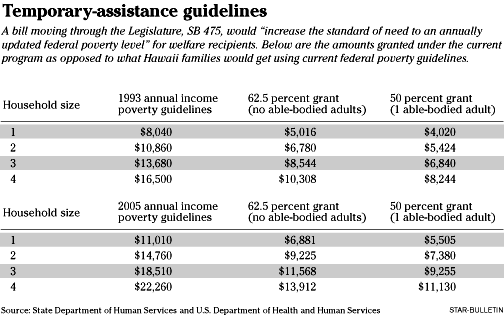Bill aims to hike
welfare checks
An isle official says it might hinder
the ability of the poor to get off
of welfare
The amount of welfare aid paid out to about 9,000 needy families in the islands monthly would be based on regularly updated poverty guidelines - rather than those set 12 years ago - under a bill moving through the Legislature.
Supporters say the measure is long overdue: They've been trying for more than a decade to update the state's "standard of assistance," which determines how much welfare, or "general assistance," recipients get. The amount is calculated as a percentage - either half or 62.5 percent, depending on family circumstances, of the 1993 poverty guidelines.
But others are concerned about the costs of implementing the bill.
State Department of Human Services Director Lillian Koller, whose agency implements welfare funds, says increasing benefit amounts would make "it more difficult for recipients to exit assistance programs."
In written testimony on the measure (SB 475), presented at a February hearing before the House Committee on Human Services, Koller also said that it is "much more effective to reward employment and self-sufficiency activities ... rather than to simply increase payments."
Koller could not be reached for further comment.
The bill is set for a second legislative hearing before the Committee on Human Services tomorrow at 9 a.m. in Capitol Conference Room 329.
Under state guidelines a three-member family with one able-bodied adult gets $570 a month in welfare assistance, or 50 percent of $1,140 - the federal monthly poverty guideline for that household in 1993.
The bill, using 2005 federal poverty guidelines, would increase the three-member family's aid by a little more than $200 a month, to an annual allotment of about $9,240.
Families with no able-bodied adults get 62.5 percent of the 1993 poverty guidelines, which is about $8,544 for a three-member household. The allotment is also available to families with an able-bodied adult in the first two months of assistance.
According to a 2002 study, conducted by the Urban Institute, a national nonpartisan economic and social policy organization, the welfare aid amount for three-member families in Hawaii was lower than at least 15 other states, including California and Delaware.
Meanwhile, Hawaii's federal poverty guidelines are higher than in any other state except Alaska. A three-member family in Hawaii is considered to be living in poverty - under the 2005 guidelines - if it makes less than $18,510 a year.
"This is what they're supposed to have for their rent and their food," said Joel Fischer, a University of Hawaii professor of social work and member of the Welfare Employment Rights Coalition, which has been a strong proponent of the bill. "This is what they're supposed to be living on."
He added that updating the assistance guidelines could also mean fewer homeless families, potentially saving funds on other social services in the long term.
Officials said the bill would likely cost about $30 million more a year than what is being shelled out for the existing allotments, with increases to stay in tune annually with the federal poverty guidelines.
Fischer argued the costs of the measure could be covered by current surpluses in the state's Temporary Assistant for Needy Families accounts.
But Sen. Gordon Trimble (R, Downtown-Waikiki), who voted against the bill when it went before the Senate Human Services Committee in February, said there are bigger financial priorities before the Legislature this year, including repairing the state's public schools.
"I'm just taking a very conservative approach," he said. "It's not that I don't want to raise it, but we have so many needs now that they far exceed the government intake."
Nalani Fujimori, deputy director for the Legal Aid Society of Hawaii, said the Work and Employment Rights Coalition has been trying for more than five years to pass legislation that would increase the standard of assistance. Along with the Legal Aid Society and WERC, Parents and Children Together, the Hawaii State Coalition Against Domestic Violence and several other groups also support the bill.
Fujimori said the measure before the Legislature this year has been the most successful of all the similar bills introduced in past years.
"This is, by far, the farthest we've come," Fischer said.
If the measure passes in tomorrow's committee, it will head to the House Finance
Committee.

[News] [Business] [Features] [Sports] [Editorial] [Do It Electric!]
[Classified Ads] [Search] [Subscribe] [Info] [Letter to Editor]
[Feedback]
